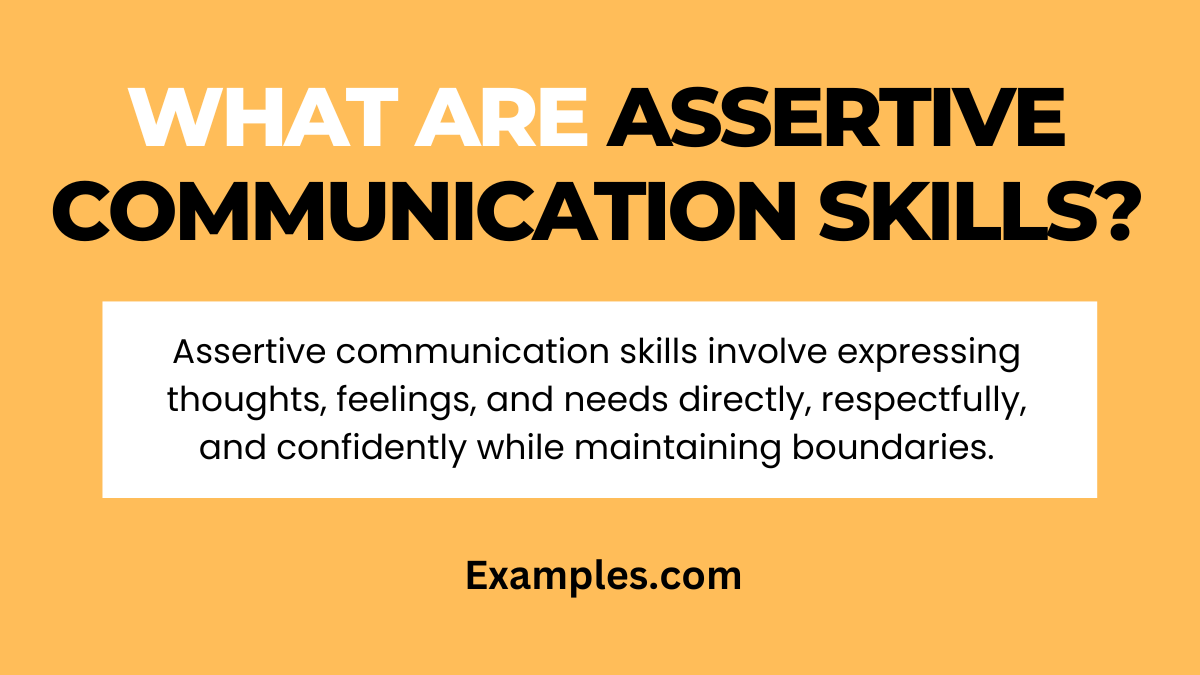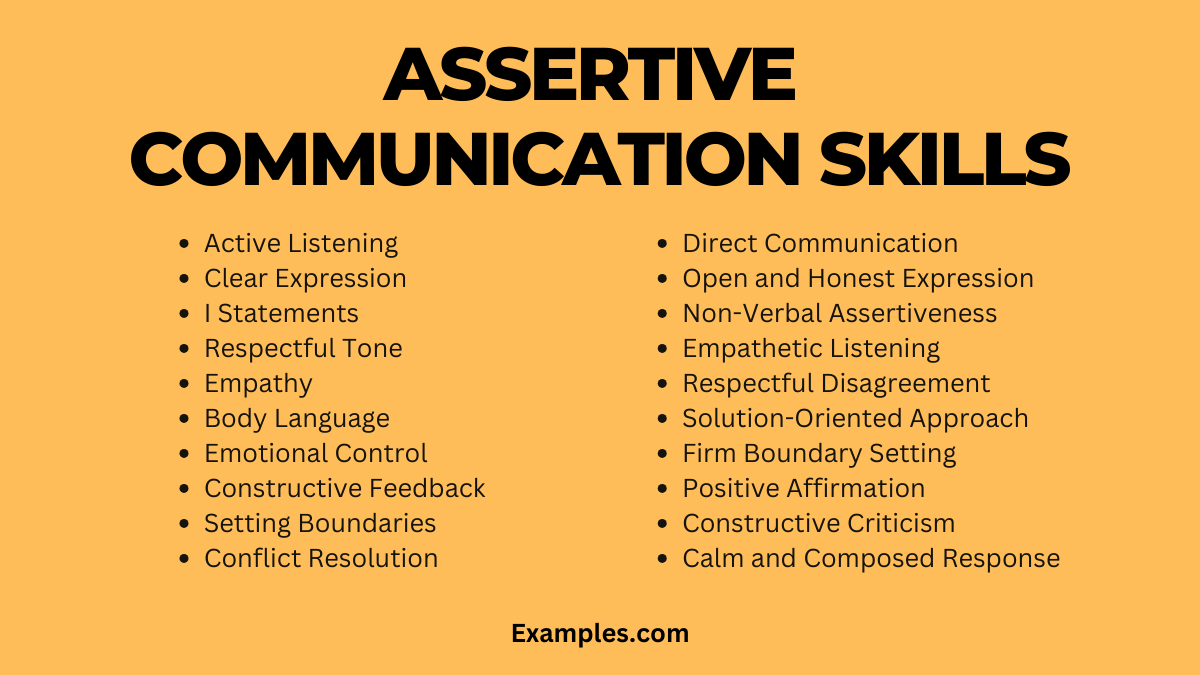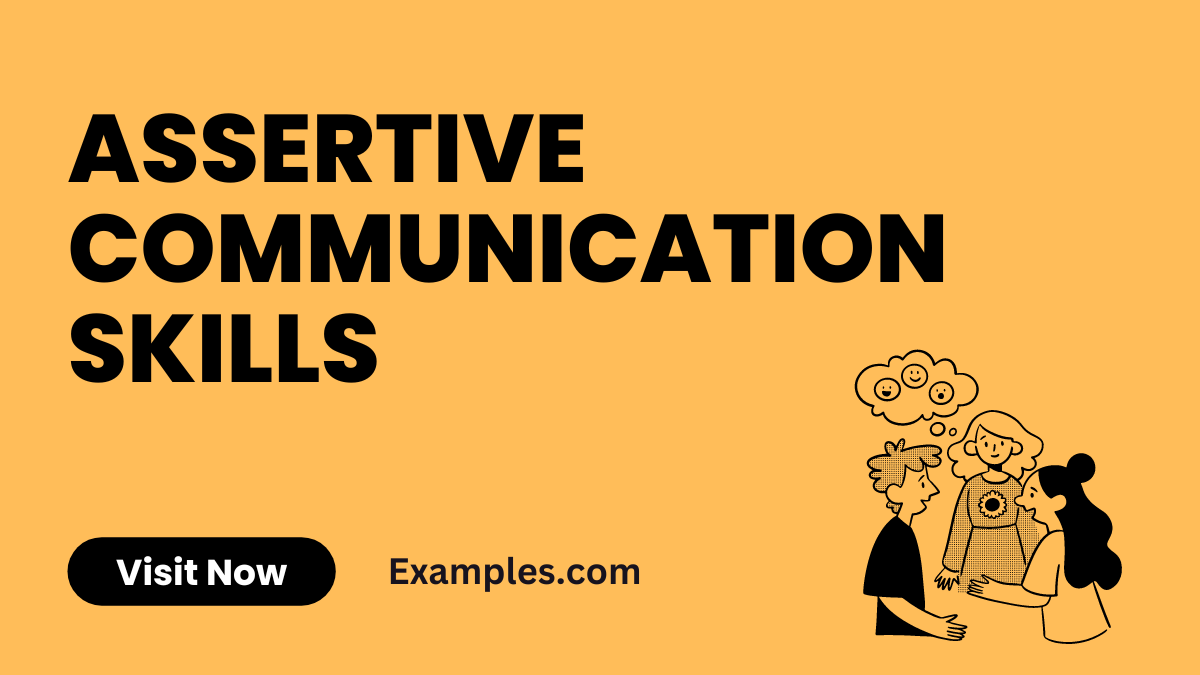19+ Assertive Communication Skills Examples
Assertive communication is a powerful skill that blends respect with clear, honest expression. It’s about standing up for your needs while respecting others. This guide delves into various techniques, from Active Listening to Constructive Feedback, providing practical examples to enhance your interpersonal abilities. Whether it’s in the workplace or personal relationships, mastering assertive communication can lead to more effective and harmonious interactions.
What are Assertive Communication Skills?

Assertive communication is the art of expressing one’s opinions and needs confidently and respectfully. It involves being open and honest, while also considering others’ feelings and rights. This skill is crucial for maintaining healthy relationships and achieving personal goals. It includes techniques like I Statements, ensuring clarity and empathy in communication. Understanding and applying assertive communication can significantly improve both personal and professional interactions.
20 Assertive Communication Skills

Assertive Communication plays a crucial role in fostering healthy relationships and effective workplace dynamics. Mastering these skills enables individuals to express their needs, opinions, and feelings confidently and respectfully. Below, we explore 20 key Assertive Communication Skills, each accompanied by a brief explanation and an example sentence.
1. Active Listening in Assertive Communication
Understanding others’ perspectives is essential. Active listening involves paying full attention and acknowledging what is being said.
Example: “I hear your concerns about the project timeline and understand why it’s important to you.”
2. Clear Expression in Assertive CommunicationBeing concise and articulate in conveying your message avoids misunderstandings.
Example: “I need the report by tomorrow noon to meet our deadline.”
3. I Statements in Assertive CommunicationUsing “I” statements helps in expressing feelings without blaming others.
Example: “I feel overwhelmed when meetings are scheduled without prior notice.”
4. Respectful Tone in Assertive CommunicationA respectful tone ensures that your message is received positively.
Example: “I appreciate your effort, but I suggest a different approach next time.”
5. Empathy in Assertive CommunicationUnderstanding and sharing the feelings of others is crucial.
Example: “I understand this task is challenging, let’s work together to find a solution.”
6. Body Language in Assertive CommunicationNon-verbal cues like eye contact and posture convey confidence.
Example: Maintaining eye contact while saying, “I am committed to this project.”
7. Emotional Control in Assertive CommunicationManaging emotions leads to constructive conversations.
Example: “Even though I’m frustrated, I’d like to discuss a solution calmly.”
8. Constructive Feedback in Assertive CommunicationOffering feedback in a positive, helpful manner is key.
Example: “Your report was good, but adding more data could enhance it.”
9. Setting Boundaries in Assertive CommunicationClearly defining your limits respects both parties’ needs.
Example: “I cannot attend meetings after 5 PM due to family commitments.”
10. Conflict Resolution in Assertive Communication
Addressing disagreements constructively avoids escalation.
Example: “Let’s find a middle ground that satisfies both our requirements.”
11. Direct Communication in Assertive Communication
Being straightforward prevents ambiguity.
Example: “I need clear answers to proceed with the plan.”
12. Open and Honest Expression in Assertive Communication
Transparency builds trust in relationships.
Example: “Honestly, I think there’s a more efficient way to handle this task.”
13. Non-Verbal Assertiveness in Assertive Communication
Using assertive gestures supports your verbal message.
Example: Nodding decisively while saying, “Yes, I can handle this responsibility.”
14. Empathetic Listening in Assertive Communication
Showing genuine concern for others’ feelings fosters understanding.
Example: “I can see why this situation is upsetting for you.”
15. Respectful Disagreement in Assertive Communication
Disagreeing without offending maintains a healthy dialogue.
Example: “I respect your viewpoint, but I have a different perspective.”
17. Solution-Oriented Approach in Assertive Communication
Focusing on solutions rather than problems is effective.
Example: “Let’s brainstorm to overcome this obstacle together.”
18. Firm Boundary Setting in Assertive Communication
Stating your limits firmly yet politely is important.
Example: “I’m unable to take on extra work beyond my capacity.”
19. Positive Affirmation in Assertive Communication
Affirming your strengths boosts confidence in communication.
Example: “I am confident in my ability to lead this project successfully.”
20. Constructive Criticism in Assertive Communication
Delivering criticism in a way that promotes growth is essential.
Example: “Your presentation was good, but practicing more could make it great.”
21. Calm and Composed Response in Assertive Communication
Responding calmly, even under pressure, is crucial.
Example: “Despite the tight deadline, I’ll ensure quality in my work.”
Assertive Communication Skills in the Workplace
Discover the power of assertive communication skills in the workplace to foster a positive, productive environment. Learn techniques like clear expression, active listening, and respectful disagreement to enhance teamwork and collaboration. Mastering these skills leads to better conflict resolution, effective leadership, and improved workplace relationships, crucial for career advancement and organizational success.
Examples of Assertive Communication Skills in the Workplace
- “I believe my idea could contribute to the project’s success. May I share it?”
Demonstrating confidence while respectfully offering ideas in a team meeting. - “I appreciate your perspective, but I see it differently. Here’s why…”
Engaging in respectful disagreement and presenting an alternative viewpoint. - “Can we explore a compromise that meets both our needs?”
Seeking collaborative solutions during a disagreement with a colleague. - “I need more clarity on this task to proceed effectively.”
Assertively requesting additional information for better task execution. - “I feel overwhelmed with the current workload. Can we discuss priorities?”
Communicating personal limits and seeking support in workload management. - “Thank you for the feedback. I will work on these areas for improvement.”
Accepting constructive criticism positively and committing to improvement. - “I have observed an issue that might affect our project timeline.”
Proactively addressing potential problems to prevent future complications. - “I would like to lead the next phase of the project, based on my experience.”
Expressing ambition and readiness for leadership opportunities. - “I understand your concerns, let’s find a way to address them.”
Acknowledging and addressing team members’ concerns effectively. - “I value our team’s diversity and believe it strengthens our project.”
Promoting a positive and inclusive work environment.
Assertive Communication Skills for Youth
Assertive communication skills for youth are essential for developing self-confidence, respect, and effective interaction abilities. These skills help in navigating peer pressure, expressing personal opinions confidently, and building strong, healthy relationships. Young individuals equipped with assertive communication can advocate for themselves and others, paving the way for successful personal and professional futures.
Examples of Assertive Communication Skills for Youth
- “I respect your opinion, but I don’t agree. Here’s what I think…”
Confidently expressing a differing opinion in a peer discussion. - “I’m not comfortable with this. Let’s find another way.”
Setting boundaries and suggesting alternatives in peer pressure situations. - “I need some time to think about this. Let’s talk later.”
Taking time to respond thoughtfully in challenging conversations. - “I feel upset when you say that. Please don’t.”
Expressing feelings clearly and setting personal boundaries in friendships. - “I worked hard on this project and would like to present it.”
Asserting oneself to gain deserved recognition in academic settings. - “I understand your point, but here’s another perspective…”
Engaging in healthy debates with respect and open-mindedness. - “I would like to join this club, what are the requirements?”
Showing initiative and interest in extracurricular activities. - “Can you explain this further? I want to understand better.”
Seeking clarification to enhance understanding in educational contexts. - “I don’t appreciate being spoken to in that manner.”
Addressing disrespectful behavior assertively and respectfully. - “I believe we can find a solution that works for everyone.”
Promoting compromise and teamwork in group activities or conflicts.
How to Improve Assertive Communication Skills?
Improving your assertive communication skills can significantly enhance both your personal and professional relationships. Assertive communication involves expressing your thoughts, feelings, and needs in a clear, honest, and respectful way. It’s about being confident but not aggressive.
Improving Assertive Communication Skills requires practice and awareness. By focusing on Active Listening, clear expression, empathy, and respectful interactions, you can enhance your ability to communicate assertively. Remember, assertiveness is about balance – being direct but respectful, honest but empathetic. With these skills, you’ll be better equipped to navigate various social and professional situations effectively.



